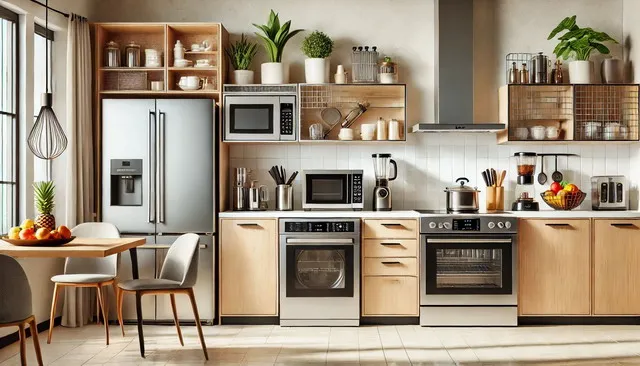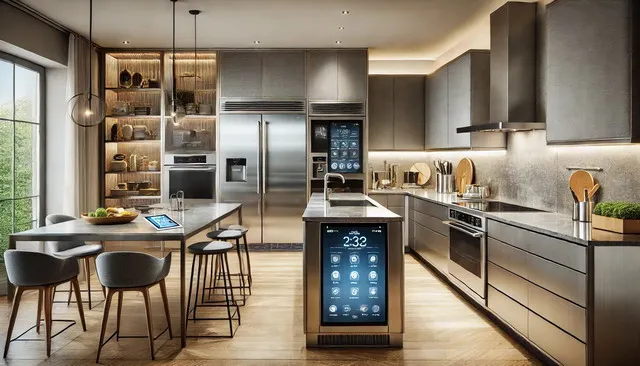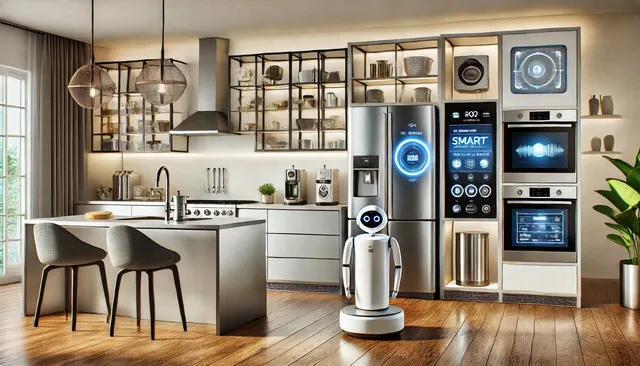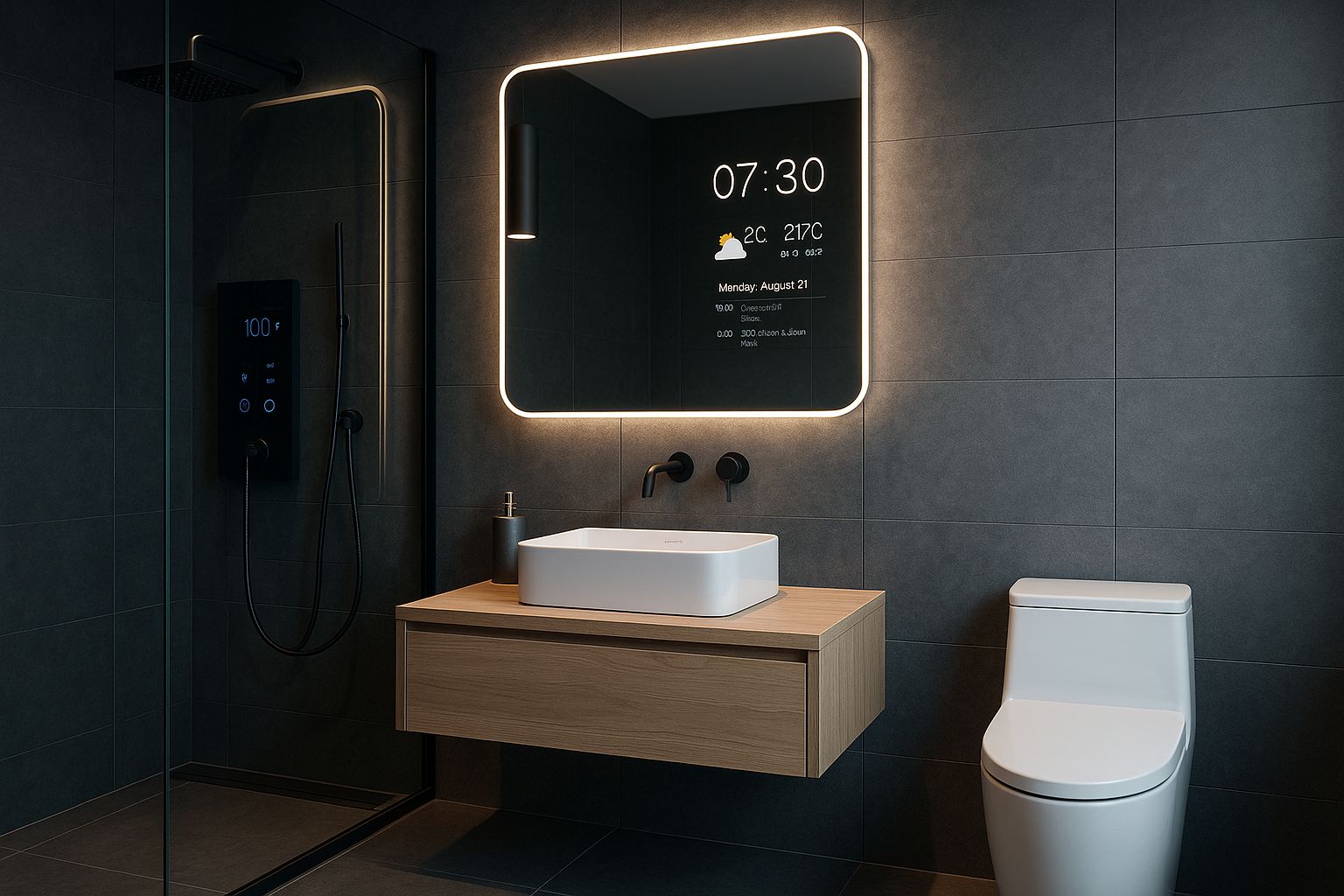The kitchen is the heart of the home, and as technology advances, so does the potential for creating innovative and smart kitchen appliances that make cooking and kitchen management more efficient, enjoyable, and sustainable. In 2026, we are witnessing a revolution in kitchen technology, driven by artificial intelligence (AI), the Internet of Things (IoT), and an increasing focus on sustainability. This article explores the key trends and advancements in smart kitchen appliances, providing a comprehensive guide to what the future holds for our kitchens.
1. Next-Generation Smart Kitchen Gadgets for 2026
The year 2026 marks a new era for smart kitchen gadgets, characterized by remarkable advancements in technology and design. These next-generation gadgets are not only smarter but also more intuitive, catering to the needs of modern households with ease and efficiency.
One of the most notable advancements is the integration of AI, which allows kitchen gadgets to learn and adapt to the user’s preferences. For example, smart ovens now come equipped with AI-powered cooking assistants that can suggest recipes based on the ingredients available in your refrigerator. These assistants can also adjust cooking times and temperatures automatically, ensuring perfect results every time.
Moreover, connectivity has become a cornerstone of smart kitchen gadgets. IoT-enabled devices can communicate with each other, creating a seamless and interconnected kitchen ecosystem. Imagine a scenario where your smart refrigerator alerts your smart oven about the ingredients you have, and your oven suggests a recipe and starts preheating at the optimal time. This level of integration transforms the cooking experience, making it more convenient and enjoyable.
Another exciting development is the focus on user experience and design. Next-generation smart kitchen gadgets are designed to be user-friendly, with intuitive touchscreens and voice controls. Manufacturers are also prioritizing sleek and modern designs that complement the aesthetics of contemporary kitchens.
In addition, sustainability is a key focus for 2026 smart kitchen gadgets. Many appliances are now designed to be energy-efficient, reducing their environmental footprint. For instance, smart dishwashers use sensors to determine the optimal amount of water and detergent needed for each load, minimizing waste and conserving resources.
Next-generation smart kitchen gadgets for 2026 are revolutionizing the way we cook and manage our kitchens. With AI integration, IoT connectivity, user-friendly designs, and a focus on sustainability, these gadgets are set to transform the heart of the home.
2. Innovative Smart Refrigerators with AI Technology 2026
Smart refrigerators have come a long way from merely being a place to store food. In 2026, these appliances are equipped with advanced AI technology that enhances their functionality and offers unparalleled convenience to users.
One of the most significant innovations in smart refrigerators is the integration of AI-powered inventory management systems. These systems can track the contents of your refrigerator in real-time, notifying you when items are running low or nearing their expiration dates. This not only helps in reducing food waste but also ensures that you always have fresh ingredients on hand.
Moreover, smart refrigerators in 2026 come with built-in cameras that allow you to check the contents of your fridge remotely. Whether you’re at the grocery store or planning your meals for the week, you can easily see what you have and what you need, all from your smartphone.
AI technology also plays a crucial role in enhancing the efficiency of smart refrigerators. These appliances can learn your usage patterns and adjust their cooling settings accordingly, optimizing energy consumption and ensuring that your food stays fresh for longer. Some models even come with AI-driven air purification systems that eliminate odors and bacteria, maintaining a clean and hygienic environment for your food.
In addition, smart refrigerators in 2026 offer personalized features that cater to individual dietary preferences and health goals. For instance, AI algorithms can suggest recipes based on the ingredients you have, your dietary restrictions, and your health objectives. This not only simplifies meal planning but also promotes healthier eating habits.
Furthermore, connectivity is a key feature of innovative smart refrigerators. These appliances can sync with other smart kitchen devices, creating a cohesive and efficient kitchen ecosystem. For example, your smart refrigerator can communicate with your smart oven to suggest recipes and preheat the oven at the right time, streamlining the cooking process.
Innovative smart refrigerators with AI technology in 2026 offer a host of features that enhance convenience, efficiency, and personalization. From real-time inventory management and remote access to energy optimization and personalized recipe suggestions, these appliances are set to revolutionize the way we store and manage our food.
3. 2026 Smart Ovens with Voice Control Features
In 2026, smart ovens have evolved to become indispensable tools in the modern kitchen, thanks to the integration of voice control features. These advanced ovens not only simplify the cooking process but also offer a level of convenience and precision that was previously unimaginable.
Voice control is one of the standout features of 2026 smart ovens. With the ability to integrate with popular voice assistants like Amazon Alexa and Google Assistant, these ovens allow users to control their cooking with simple voice commands. Whether you want to preheat the oven, set a timer, or adjust the temperature, you can do so effortlessly without lifting a finger.
This hands-free operation is particularly beneficial when you’re busy with other tasks in the kitchen. For instance, if you’re preparing multiple dishes simultaneously, you can manage your oven without interrupting your workflow. This feature also enhances accessibility for individuals with mobility issues or disabilities, making cooking more inclusive.
In addition to voice control, smart ovens in 2026 come equipped with advanced AI capabilities. These ovens can learn your cooking preferences and suggest optimal settings for different recipes. For example, if you frequently bake cookies, the oven can remember your preferred baking time and temperature, ensuring consistent results every time.
Moreover, many smart ovens now feature built-in recipe databases that you can access via voice commands. You can ask the oven for recipe recommendations based on the ingredients you have, and it will guide you through the cooking process step-by-step. This not only makes cooking more convenient but also encourages you to try new recipes and expand your culinary skills.
Another notable advancement is the integration of smart sensors and cameras. These sensors can monitor the cooking process in real-time, making adjustments as needed to prevent overcooking or undercooking. Some models even come with cameras that allow you to check on your food remotely via your smartphone. This ensures that your meals are cooked to perfection, even if you’re not in the kitchen.
Energy efficiency is also a key focus for 2026 smart ovens. These appliances are designed to optimize energy usage, reducing their environmental impact and saving you money on utility bills. For instance, some smart ovens can detect when a dish is nearly done and automatically reduce the temperature to keep the food warm without overcooking it.
2026 smart ovens with voice control features are transforming the cooking experience. With hands-free operation, personalized settings, advanced AI capabilities, and energy-efficient designs, these ovens offer unparalleled convenience and precision, making them a must-have in any modern kitchen.
4. Advanced Smart Kitchen Appliances with IoT Integration 2026
The Internet of Things (IoT) has revolutionized various aspects of our lives, and in 2026, it is playing a pivotal role in transforming kitchen appliances. Advanced smart kitchen appliances with IoT integration offer a level of connectivity and automation that streamlines kitchen tasks and enhances overall efficiency.
IoT integration allows kitchen appliances to communicate with each other, creating a cohesive and interconnected kitchen ecosystem. This connectivity enables appliances to work together seamlessly, optimizing the cooking process and reducing the effort required from the user. For instance, your smart refrigerator can communicate with your smart oven, suggesting recipes based on the ingredients available and preheating the oven at the right time.
One of the key benefits of IoT integration is remote control and monitoring. With IoT-enabled appliances, you can control and monitor your kitchen devices from anywhere using your smartphone or tablet. Whether you’re at work, running errands, or simply relaxing in another room, you can check the status of your appliances, adjust settings, and receive notifications. This level of control enhances convenience and ensures that you can manage your kitchen tasks efficiently, even when you’re not physically present.
Moreover, IoT integration allows for automation and customization. Advanced smart kitchen appliances can be programmed to perform specific tasks at designated times, reducing the need for manual intervention. For example, you can set your smart coffee maker to start brewing your favorite blend every morning at the same time, ensuring that you wake up to a fresh cup of coffee without any effort. Similarly, your smart dishwasher can be scheduled to run during off-peak hours, optimizing energy usage and reducing utility costs.
IoT-enabled appliances also provide valuable insights and data. These appliances can track usage patterns, energy consumption, and maintenance needs, providing you with detailed reports and recommendations. For instance, your smart refrigerator can alert you when it’s time to replace the water filter or when the temperature settings need adjustment. This proactive approach to maintenance ensures that your appliances operate efficiently and have a longer lifespan.
Security and safety are paramount in IoT-integrated kitchen appliances. These devices come with advanced security features to protect against cyber threats and unauthorized access. For example, smart ovens and cooktops are equipped with safety sensors that detect potential hazards, such as gas leaks or overheating, and automatically shut down the appliance to prevent accidents.
Advanced smart kitchen appliances with IoT integration in 2026 offer a range of benefits, including remote control and monitoring, automation, customization, data insights, and enhanced security. These appliances create a connected and efficient kitchen environment, making cooking and kitchen management more convenient and enjoyable.
5. 2026 Smart Dishwashers with Energy-Saving Technology
In 2026, smart dishwashers have evolved to become more than just convenient appliances; they are now equipped with advanced energy-saving technology that reduces their environmental impact and lowers utility costs. These innovations make smart dishwashers an essential addition to any modern kitchen.
Energy efficiency is a primary focus for 2026 smart dishwashers. These appliances are designed to minimize water and energy consumption without compromising on performance. One of the key features is the use of smart sensors that detect the level of soil and the load size, adjusting the water usage and cycle time accordingly. This ensures that only the necessary amount of water and energy is used for each wash, reducing waste and conserving resources.
Moreover, smart dishwashers in 2026 are equipped with advanced drying technologies that further enhance energy efficiency. Traditional dishwashers rely on heating elements to dry the dishes, which can consume a significant amount of energy. In contrast, modern smart dishwashers use techniques like zeolite minerals or condensation drying, which are more energy-efficient and gentler on dishes. These methods not only save energy but also reduce the risk of damage to delicate items.
Connectivity is another important aspect of 2026 smart dishwashers. IoT integration allows these appliances to be controlled and monitored remotely using a smartphone or tablet. You can start, pause, or schedule wash cycles from anywhere, ensuring that your dishes are cleaned at the most convenient times. Additionally, smart dishwashers can send notifications when a cycle is complete or if there are any issues, such as a low rinse aid level or a blockage.
The integration of AI technology in smart dishwashers has also led to significant advancements in their functionality. AI algorithms can analyze usage patterns and recommend optimal settings for different types of loads. For example, the dishwasher can suggest a quick wash cycle for lightly soiled dishes or an intensive cycle for heavily soiled pots and pans. This level of customization ensures that each wash cycle is tailored to the specific needs of the user, improving efficiency and performance.
In addition to energy-saving features, 2026 smart dishwashers prioritize user convenience and ease of use. Many models come with touchscreens or voice control capabilities, allowing users to operate the appliance with simple commands. This hands-free operation is particularly useful when your hands are full or when you’re multitasking in the kitchen.
Furthermore, smart dishwashers are designed with sustainability in mind. Many manufacturers use eco-friendly materials and production processes, reducing the overall environmental impact of the appliance. Some models also feature recyclable components and energy-saving modes that comply with the latest environmental standards.
2026 smart dishwashers with energy-saving technology offer a range of benefits, including reduced water and energy consumption, advanced drying techniques, remote control and monitoring, AI-driven customization, and sustainable design. These appliances not only make dishwashing more efficient and convenient but also contribute to a greener and more sustainable future.
6. Smart Kitchen Appliances with Advanced Cooking Automation 2026
In 2026, smart kitchen appliances have reached new heights with advanced cooking automation, transforming the way we prepare meals and manage our kitchens. These appliances are designed to streamline the cooking process, reduce manual effort, and deliver consistent, high-quality results every time.
One of the most significant advancements in cooking automation is the integration of AI and machine learning algorithms. These technologies enable smart kitchen appliances to learn from your cooking habits and preferences, making adjustments to cooking times and temperatures to ensure optimal results. For example, a smart oven can automatically recognize the type of food you’re cooking and select the appropriate settings, eliminating the guesswork and reducing the risk of overcooking or undercooking.
Additionally, many smart kitchen appliances now come with pre-programmed cooking modes and recipes. These modes are tailored to specific dishes, providing step-by-step instructions and automatically adjusting settings as needed. This feature is particularly useful for novice cooks or those looking to try new recipes, as it guides them through the cooking process with ease and precision.
Another notable development is the use of smart sensors in cooking appliances. These sensors can monitor various aspects of the cooking process, such as temperature, humidity, and doneness. For instance, a smart cooktop can detect when a pot of water is boiling and automatically reduce the heat to prevent spills. Similarly, a smart meat thermometer can monitor the internal temperature of a roast and alert you when it reaches the desired level of doneness. These sensors not only enhance the accuracy of cooking but also help prevent accidents and improve safety in the kitchen.
Connectivity is a key feature of 2026 smart kitchen appliances with advanced cooking automation. IoT integration allows these appliances to communicate with each other and with your smartphone or tablet. This connectivity enables you to control and monitor your appliances remotely, receive notifications and alerts, and access a wealth of online resources, such as recipe databases and cooking tutorials. For example, you can start preheating your smart oven while you’re on your way home from work, ensuring that it’s ready to go when you arrive.
In addition to improving convenience and efficiency, advanced cooking automation also promotes healthier eating habits. Many smart kitchen appliances are equipped with features that support healthy cooking techniques, such as air frying, steaming, and sous-vide. These methods require less oil and preserve more nutrients compared to traditional cooking methods. Moreover, some appliances come with AI-driven meal planning and nutrition tracking capabilities, helping you make informed choices about your diet and achieve your health goals.
Sustainability is also a focus for 2026 smart kitchen appliances. Energy-efficient designs, eco-friendly materials, and waste-reducing features are becoming standard in many appliances. For instance, some smart ovens have self-cleaning modes that use minimal water and energy, while others are designed to cook multiple dishes simultaneously, reducing overall energy consumption.
Smart kitchen appliances with advanced cooking automation in 2026 offer a host of benefits, including AI-driven personalization, pre-programmed cooking modes, smart sensors, IoT connectivity, healthy cooking features, and sustainable designs. These innovations are revolutionizing the way we cook, making it easier, safer, and more enjoyable to prepare delicious and nutritious meals at home.
7. 2026 Smart Coffee Makers with Personalized Brewing Options
Coffee lovers rejoice! In 2026, smart coffee makers have taken personalized brewing to a whole new level, offering a range of features that cater to individual preferences and elevate the coffee experience.
One of the standout features of 2026 smart coffee makers is the ability to customize every aspect of the brewing process. These appliances allow you to adjust parameters such as water temperature, brew strength, grind size, and brew time, ensuring that you get the perfect cup of coffee every time. Whether you prefer a strong espresso, a smooth cappuccino, or a delicate pour-over, you can fine-tune your coffee maker to suit your taste.
Personalization is further enhanced by AI technology, which enables smart coffee makers to learn your preferences and suggest optimal settings. For instance, if you consistently prefer a certain type of coffee in the morning and a different type in the afternoon, the coffee maker can remember these preferences and automatically adjust its settings accordingly. This level of customization ensures that you always enjoy your favorite brew, without having to manually adjust the settings each time.
In addition to customization, smart coffee makers in 2026 offer connectivity features that make brewing coffee more convenient than ever. IoT integration allows you to control and monitor your coffee maker remotely using your smartphone or tablet. You can start brewing a fresh cup of coffee while you’re still in bed, or schedule your coffee maker to start brewing at a specific time, ensuring that your coffee is ready when you wake up. You can also receive notifications when your coffee is ready or when it’s time to clean the machine.
Another exciting development is the integration of built-in grinders in smart coffee makers. These grinders allow you to grind your coffee beans to the perfect consistency, ensuring maximum flavor and freshness. Some models even come with multiple grinder settings, allowing you to choose the ideal grind size for different types of coffee. This feature eliminates the need for a separate grinder, saving you space and simplifying the brewing process.
Moreover, smart coffee makers in 2026 are designed with user experience in mind. Many models come with intuitive touchscreens and voice control capabilities, allowing you to operate the appliance with ease. Whether you want to adjust the settings, select a brewing mode, or check the machine’s status, you can do so with simple voice commands or a few taps on the screen.
Sustainability is also a key focus for smart coffee makers in 2026. These appliances are designed to minimize waste and energy consumption, with features such as reusable filters, eco-friendly materials, and energy-saving modes. Some models even come with automated cleaning and maintenance routines, ensuring that the machine operates efficiently and has a longer lifespan.
2026 smart coffee makers with personalized brewing options offer a range of benefits, including customizable settings, AI-driven recommendations, IoT connectivity, built-in grinders, user-friendly interfaces, and sustainable designs. These appliances are transforming the coffee experience, making it easier, more convenient, and more enjoyable to brew the perfect cup of coffee at home.
8. AI-Powered Smart Kitchen Devices for Healthy Cooking 2026
In 2026, the integration of AI technology in smart kitchen devices is revolutionizing the way we approach healthy cooking. These AI-powered appliances offer a range of features that make it easier to prepare nutritious meals, track dietary goals, and maintain a healthy lifestyle.
One of the most significant advancements in AI-powered kitchen devices is their ability to provide personalized meal planning and recipe suggestions. These devices can analyze your dietary preferences, health goals, and ingredient availability to recommend recipes that meet your nutritional needs. For example, if you’re following a low-carb diet, the AI can suggest recipes that are high in protein and low in carbohydrates, ensuring that you stay on track with your dietary goals.
Moreover, AI-powered kitchen devices can adapt to your cooking habits and preferences, making adjustments to recipes and cooking methods as needed. For instance, if you prefer your vegetables to be steamed rather than sautéed, the AI can modify the recipe instructions accordingly. This level of customization ensures that you enjoy meals that are tailored to your taste while still meeting your nutritional requirements.
Another notable feature of AI-powered kitchen devices is their ability to track and analyze your dietary intake. These devices can monitor the nutritional content of the meals you prepare, providing detailed information about calories, macronutrients, and micronutrients. This data can be synced with health and fitness apps, allowing you to track your progress and make informed decisions about your diet. Some devices even offer real-time feedback and suggestions, helping you make healthier choices on the go.
AI technology also plays a crucial role in enhancing the efficiency and accuracy of cooking processes. Smart kitchen devices equipped with AI can monitor the cooking process in real-time, making adjustments to temperature and cooking time to ensure optimal results. For example, a smart oven can detect when a dish is nearing completion and automatically reduce the heat to prevent overcooking. This not only improves the quality of the meals but also helps preserve the nutritional value of the ingredients.
Connectivity is a key feature of AI-powered kitchen devices in 2026. IoT integration allows these devices to communicate with each other and with your smartphone or tablet, creating a connected and efficient kitchen environment. For instance, your smart refrigerator can suggest recipes based on the ingredients you have, and your smart oven can automatically preheat to the required temperature. This seamless integration streamlines the cooking process and reduces the effort required to prepare healthy meals.
Furthermore, AI-powered kitchen devices are designed with user convenience in mind. Many models come with intuitive touchscreens, voice control capabilities, and automated cooking modes, making it easy to operate the appliances and follow recipes. These features are particularly useful for busy individuals and families, as they simplify meal preparation and ensure consistent results.
Sustainability is also a focus for AI-powered kitchen devices. These appliances are designed to minimize waste and energy consumption, with features such as precise portion control, eco-friendly materials, and energy-efficient cooking methods. By promoting sustainable cooking practices, these devices help reduce the environmental impact of meal preparation.
AI-powered smart kitchen devices for healthy cooking in 2026 offer a range of benefits, including personalized meal planning, dietary tracking, real-time cooking adjustments, IoT connectivity, user-friendly interfaces, and sustainable designs. These innovations are transforming the way we cook and eat, making it easier to maintain a healthy lifestyle and enjoy nutritious, delicious meals at home.
9. 2026 Smart Kitchen Appliances with Remote Monitoring Capabilities
In 2026, smart kitchen appliances with remote monitoring capabilities are revolutionizing the way we manage our kitchens, offering a level of convenience and control that enhances efficiency and peace of mind. These appliances allow users to monitor and control their kitchen devices from anywhere, using their smartphones or tablets.
One of the primary benefits of remote monitoring is the ability to manage kitchen tasks even when you’re not at home. Whether you’re at work, running errands, or simply relaxing in another room, you can check the status of your appliances, adjust settings, and receive notifications. For example, you can start preheating your smart oven while you’re still on your way home, ensuring that it’s ready to cook as soon as you arrive. Similarly, you can monitor the progress of your dishwasher and receive alerts when the cycle is complete, allowing you to unload the dishes at your convenience.
Remote monitoring also enhances the safety and security of your kitchen. Smart appliances equipped with sensors can detect potential hazards, such as gas leaks, overheating, or malfunctioning components. In the event of a safety issue, the appliance can send an alert to your smartphone, allowing you to take immediate action. Some models even come with automatic shut-off features that activate in response to detected hazards, preventing accidents and protecting your home.
In addition to safety, remote monitoring capabilities offer valuable insights and data about your appliances. You can track usage patterns, energy consumption, and maintenance needs, receiving detailed reports and recommendations. For instance, your smart refrigerator can alert you when it’s time to replace the water filter or when the temperature settings need adjustment. This proactive approach to maintenance ensures that your appliances operate efficiently and have a longer lifespan.
Connectivity is a key feature of 2026 smart kitchen appliances with remote monitoring capabilities. IoT integration allows these appliances to communicate with each other and with other smart home devices, creating a connected and efficient kitchen ecosystem. For example, your smart refrigerator can sync with your smart oven to suggest recipes based on the ingredients available and automatically preheat the oven at the optimal time. This level of integration streamlines the cooking process and reduces the effort required to prepare meals.
Moreover, remote monitoring capabilities promote sustainability by optimizing energy usage and reducing waste. Many smart appliances are designed to operate more efficiently, adjusting their settings based on real-time data and user preferences. For example, a smart dishwasher can determine the optimal amount of water and detergent needed for each load, minimizing waste and conserving resources. Additionally, some appliances come with energy-saving modes that can be activated remotely, further reducing their environmental impact.
User convenience is also a focus for smart kitchen appliances with remote monitoring capabilities. These appliances often come with intuitive apps that make it easy to control and monitor your devices. You can set timers, adjust settings, and receive alerts with just a few taps on your smartphone. Voice control is another convenient feature, allowing you to operate your appliances hands-free using popular voice assistants like Amazon Alexa or Google Assistant.
2026 smart kitchen appliances with remote monitoring capabilities offer a range of benefits, including enhanced convenience, safety, data insights, connectivity, sustainability, and user-friendly interfaces. These innovations are transforming the way we manage our kitchens, making it easier and more efficient to cook, clean, and maintain our appliances from anywhere.
10. Sustainable and Eco-Friendly Smart Kitchen Gadgets 2026
In 2026, sustainability and eco-friendliness are at the forefront of smart kitchen gadget design, as manufacturers strive to create appliances that reduce environmental impact and promote green living. These sustainable smart kitchen gadgets offer a range of features that conserve resources, minimize waste, and support a more eco-conscious lifestyle.
One of the key trends in sustainable smart kitchen gadgets is energy efficiency. Many appliances are designed to use less energy without compromising performance. For example, smart ovens and cooktops are equipped with sensors that optimize energy usage by adjusting cooking times and temperatures based on real-time data. Similarly, smart refrigerators use advanced cooling technologies that maintain optimal temperatures with minimal energy consumption. These energy-efficient designs help reduce greenhouse gas emissions and lower utility bills.
Water conservation is another important focus for sustainable smart kitchen gadgets. Smart dishwashers, for instance, use sensors to determine the optimal amount of water needed for each load, ensuring that only the necessary amount is used. Some models even feature innovative drying technologies that use less water and energy compared to traditional methods. Additionally, smart faucets with touchless and sensor-based controls help reduce water waste by delivering precise amounts of water only when needed.
Material sustainability is also a priority for 2026 smart kitchen gadgets. Many manufacturers are using eco-friendly materials and production processes to create their appliances. This includes the use of recycled and recyclable materials, as well as non-toxic and biodegradable components. By choosing sustainable materials, these gadgets not only reduce their environmental footprint but also contribute to a healthier home environment.
Waste reduction is another key aspect of sustainable smart kitchen gadgets. Appliances like smart refrigerators and food processors come with features that help reduce food waste by keeping track of expiration dates and providing storage recommendations. Some smart gadgets even offer composting capabilities, allowing users to turn food scraps into nutrient-rich compost for their gardens. This promotes a circular economy and reduces the amount of food waste sent to landfills.
Connectivity and automation also play a role in promoting sustainability. IoT-enabled smart kitchen gadgets can communicate with each other and with other smart home devices to create a connected ecosystem that optimizes resource usage. For example, a smart refrigerator can suggest recipes based on available ingredients, reducing the likelihood of food spoilage. Additionally, smart kitchen gadgets can be programmed to operate during off-peak hours, taking advantage of lower energy rates and reducing strain on the power grid.
Furthermore, many sustainable smart kitchen gadgets come with features that support a plant-based or low-impact diet. For instance, smart blenders and juicers are designed to make it easier to prepare plant-based meals and beverages, encouraging healthier and more sustainable eating habits. Some gadgets even offer personalized nutrition tracking and meal planning features, helping users make informed choices about their diet and reduce their overall environmental impact.
Sustainable and eco-friendly smart kitchen gadgets in 2026 offer a range of benefits, including energy efficiency, water conservation, material sustainability, waste reduction, connectivity, and support for a sustainable diet. These innovations are helping to create a greener and more sustainable future, making it easier for individuals and families to reduce their environmental footprint and live more eco-conscious lives.
Conclusion
The advancements in smart kitchen appliances for 2026 are transforming the heart of the home. From next-generation gadgets and AI-powered refrigerators to voice-controlled ovens and IoT-integrated devices, these innovations offer unparalleled convenience, efficiency, and personalization. With a strong focus on sustainability, energy-saving technologies, and healthy cooking features, smart kitchen appliances are not only making our lives easier but also promoting a more sustainable and health-conscious lifestyle. As we look to the future, it’s clear that the kitchen will continue to be a hub of innovation, bringing exciting possibilities for enhancing our daily routines and improving our overall quality of life.











